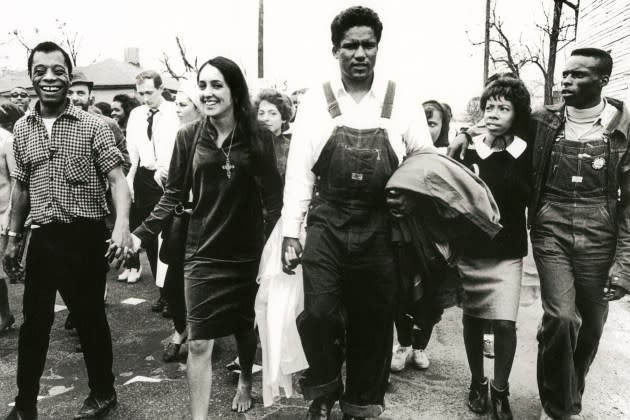Joan Baez Documentary ‘I Am A Noise’ Follows Singer’s Farewell Tour and Personal Moments
- Oops!Something went wrong.Please try again later.

Joan Baez reflects on her 60-year career in the trailer for the new documentary Joan Baez I Am a Noise. “I don’t think anybody at a young age who gets famous has the slightest idea that it’ll ever end,” she says as footage of her walking through a field now contrasts black-and-white pics from her early folk days. In another introspective moment, she says, “I was the right voice at the right time; it just shot me in another whole stratosphere.”
The film, which features Baez’s previously unseen home movies, diary entries, therapy tapes, art, and audio recordings, premieres in New York on Oct. 6. A wider release, including Los Angeles, will begin on Oct. 13.
More from Rolling Stone
Joan Baez, Odetta Albums Focus of New Vinyl Boxset Celebrating Folk Label Vanguard
Flashback: Lana Del Rey Enlists Joan Baez for 'Diamonds and Rust'
A trio of filmmakers, Karen O’Connor, Miri Navasky, and Maeve O’Boyle, directed the picture, which traces Baez’s final tour. “I’ve always said I wouldn’t want to do a farewell tour because people who say that always come back,” she says in the trailer. “Maybe it’d be nice to celebrate 55 years of it.” The tour ended in 2019.
“Because of my history with Joan, our team was able to embed with her on tour and at home and that extraordinary access enabled us to create an intensely intimate film filled with unexpected insights, heartbreak and humor,” O’Connor, who has known Baez since 1989, said in a statement. “A biographical strand captures Joan’s early years and meteoric rise to fame, a darker psychological thread delves into her inner ‘demons’ and a contemporary strand tracks Joan facing the end of a 60-year music career. Although we knew Baez’s final tour would anchor her contemporary story, we weren’t ever trying to make a concert film.”
The picture also finds her reflecting on her relationship with Bob Dylan, her involvement in the civil rights movement, working with Dr. Martin Luther King, Jr., and her music as a whole. “Joan’s willingness to explore the uncomfortable and painful places in her life gives this film its emotional power,” O’Connor said. “And by going there, Joan may be opening a door for somebody else to go there too.”
Best of Rolling Stone
